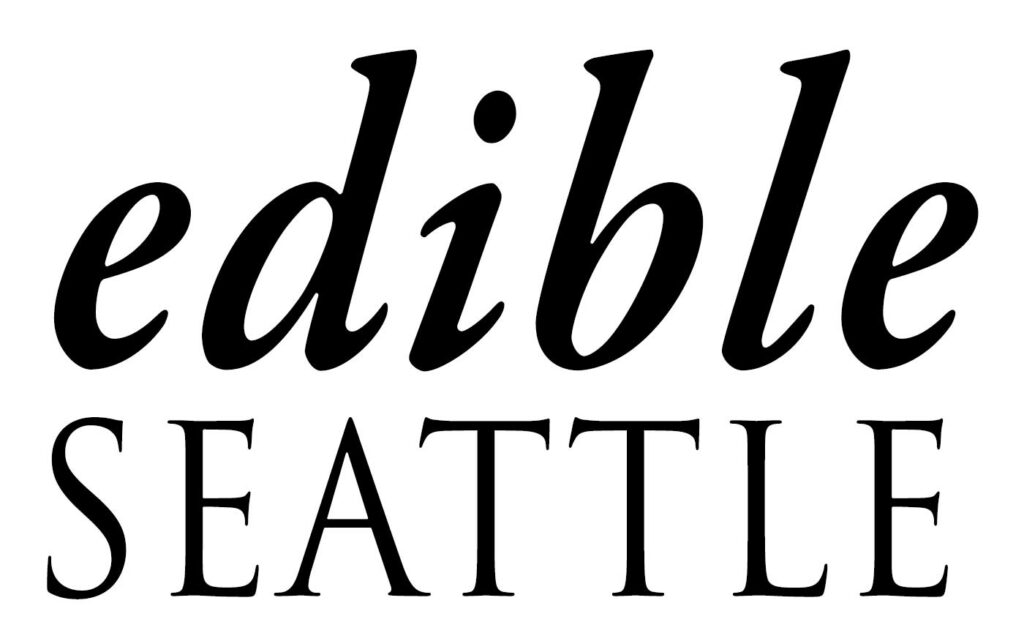
by Ellen Bhang
photo by Robert Galvin
Ignore what comes to mind when you first hear, “American Traditions Picnic.” There are no pie eating contests, three-legged races, or bandstands festooned with red-white-and-blue bunting. Gerry Warren, the venerable co-leader of Slow Food Seattle, had a different set of images in mind. This picnic, he explained, would showcase culturally important foods native to the Pacific Northwest. “Did I mention that Seattle’s most talented chefs will be doing the cooking?” he said.
For the second year in a row, the Seattle chapters of Slow Food and Chefs Collaborative hosted this unique event designed to educate new and potential members. Slow Food, with its mission to promote food that is good, clean and fair, is a natural partner to Chefs Collaborative, a national network of chefs committed to fostering a more sustainable food supply. Both organizations are partners in Renewing America’s Food Traditions (RAFT), an alliance dedicated to preserving North America’s heritage foods.
These include heirloom vegetables and fruits, native livestock breeds and indigenous seafood such as wild salmon. Seth Caswell, President of Seattle Chefs Collaborative, believes that chefs play a crucial role in saving these rare foods. “Chefs want the cool ‘new’ products for their menus. We encourage them to feature the cool ‘old’ products as well. The maxim ‘Eat it to save it’ illustrates what this is all about,” he said.
By showcasing them on menus, patrons try them and create demand in the market. Farmers and ranchers are motivated to raise more, and promote biodiversity in the process.
Hiking up to the Daybreak Star Cultural Center in Discovery Park, picnic attendees caught a whiff of something smoky and succulent in the autumn air. Coming closer, they came upon sockeye salmon on a rustic outdoor grill.
Curling smoke enveloped the thick filets. Behind the operation was Riley Starks, the chef and owner of Willows Inn on Lummi Island. He is one of our region’s biggest proponents of reefnet fishing – a sustainable method of salmon fishing that has been practiced for centuries by Northwest native tribes. For Native tribes, Riley explained, reefnetting is as much a social event as it is about catching salmon. Each bite was silky and unctuous, finished with a light char from the smoldering apple wood. It lived up to those tantalizing aromas first encountered on the trail.
The picnic—moved indoors to sidestep threatening rain—was in full swing. Outfitted with their own plates for this “green” event, families and friends converged on the main hall. They eagerly awaited Seth’s foraged lobster mushrooms served atop speckled trout lettuce. They chatted with Dustin Ronspies from Art of the Table as he piled pulled Churro lamb onto crisp flatbread. The Navajo-Churro, the oldest surviving breed of sheep indigenous to North America, was sourced locally from One Clay Hill Farm on Lopez Island. Braised for 18 hours, it was meltingly tender.
Culinary students from Seattle Central Community College assisted Kären Jurgensen from Quillisascut Farm School. This team spooned granité made from wild huckleberries and sage over
Connections to Native American traditions permeated the event. Mary Hunter, a teacher and storyteller, sung a Makah prayer of blessing and thanks. Her son Carl, attired in traditional garb made of woven cedar, accompanied her. Their presence made me more fully appreciate the Makah Ozette potatoes that Maria Hines of Tilth had prepared.
For more than 200 years, the Makah Nation has tended this oblong-shaped fingerling. It is said to have traveled with Spanish explorers from South America to Neah Bay in the late 1700s. It has been grown in backyard gardens of the Makah for so long that it is considered a traditional food. This history of care enriched every bite.
As the event wound down, there was a renewed burst of activity as the chefs produced new trays of food. Seth had encouraged them to reserve extra portions of each dish for a special purpose.
Our destination just down the hill was the most recent relocation of Seattle’s Tent City. Now known as “Nickelsville”, this homeless encampment protested the mayor’s policy of sweeping homeless camps off city property. Nickelsville consisted of dozens of bright pink tents, a lone barbecue grill, and a long table, where chefs and residents set the food.
We all grew quiet as Mary spoke. She reminded us that we are connected to the earth by what we eat. We are connected to one another through acts of caring. “While we come from different places, and engage in different methods, we all work toward wholeness,” she said. Uttering the Makah words meaning “of highest honor” she blessed everyone around the table.
Ellen Bhang is a freelance writer currently based in Seattle. The new year will find her relocating to Boston to study gastronomy.
